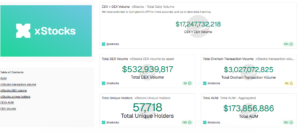Initial coin offerings are back, but with a twist.
That’s the upshot of the news that Legion, an onchcain fundraising project, is extending its services directly into the crypto exchange Kraken and opening token sales to a much wider audience than before.
By tapping Legion, crypto projects launching tokens can hand-select investors based on onchain data, social media activity, and GitHub commits, among other metrics.
ICOs got a bad reputation following their prior boom in 2017 and 2018, which saw over 2,000 projects raise some $13 billion.
The problem?
The speed and low barriers to entry meant ICOs were prime targets for unsavory behavior, with at least $1.3 billion being lost to scams, according to Statis Group.
Legion aims to change that with Legion Scores, its criteria for selecting investors. This is meant to weed out bots as well as unscrupulous token buyers.
“Legion Scores level the playing field for everyone,” Fabrizio Giabardo, Legion co-founder, said. “The size of your wallet isn’t what matters. What matters is how you’ve contributed to the industry or project itself.”
More of the project’s tokens will be made available for sale on Kraken on a first-come, first-served basis to the exchange’s users. Tokens will then be immediately listed on the exchange, which has more than 15 million global users.
“As the famous quote goes; First-time founders are obsessed with product, second-time founders are obsessed with distribution,” Giabardo said. “We know what Legion offers works well, now we have the chance to scale that.”
The two companies have yet to reveal what the first token sale will be, but said it will be announced soon.
Kraken also joined VanEck and Brevan Howard Digital in a $5 million funding round in Legion in August.
Legion’s recent ascent is yet another example of the changing tides in crypto.
ICO comeback
When they were first introduced, ICOs opened up an ultra-lucrative mechanism for crypto projects to raise record amounts of money in a very short period.
EOS, a crypto project meant to compete against Ethereum, raised more than $4.2 billion in 2018, making it the largest offering in the industry’s history.
It didn’t take long, however, for the US Securities and Exchange Commission to crack down on the scheme.
Yet, crypto chieftains like Maple Finance’s CEO Sid Powell have been prophesying the return of the ICO, promising that history won’t repeat itself.
“ICOs have evolved. The old days of just sending ETH to an address based on a white paper are unlikely to come back again,” Powell told DL News in December. “We’re also now in a very different environment than in 2017.”
Indeed, since taking office, US President Donald Trump has sought to ease regulatory burdens on the industry, which has helped bolster new highs for leading cryptocurrencies, including Bitcoin and Ethereum.
That has paved the way for more new ICOs.
In June, Plasma, a forthcoming stablecoin-focused blockchain, raised $500 million within five minutes through such an offering.
This time around, the Legion co-founders are hoping to keep the advantages — ultra-fast fundraisers from a global investor group – and exclude the disadvantages — teams using raised funds to sustain their project’s development.
Fixing market structure
As part of the onboarding process to Legion, projects looking to execute a token sale must issue a white paper that is also compliant with Europe’s strict Markets in Crypto-Assets rules, or MiCA.
“Our goal is to fix the broken parts of the current market structure, by making the optimal outcome the one where disclosures and transparency are the standard, not the exception,” Giabardo told DL News.
“To reduce information asymmetry, and allow people to make informed decisions to participate, themselves.”
Liam Kelly is a DeFi Correspondent at DL News. Got a tip? Email at liam@dlnews.com.



